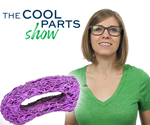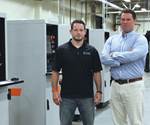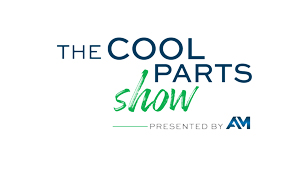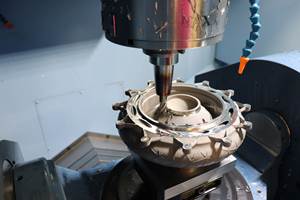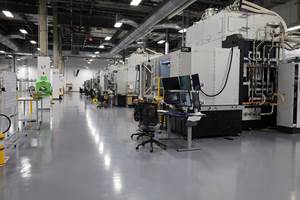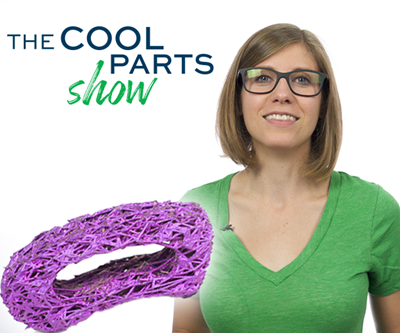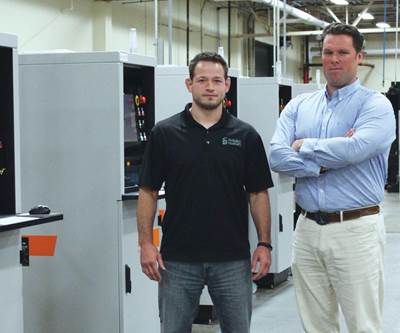Implant Maker Increases Production: The Cool Parts Show #12
Tangible Solutions has been 3D printing more implants than ever before as hospitals get ready for the coming surge in elective surgeries. The Cool Parts Show checks in to explore how additive manufacturing is advancing during the coronavirus crisis.
For 3D printed medical implant maker Tangible Solutions, the pandemic has not led to an interruption or a slowdown in work. Far from it — as implant suppliers stock up to get ready for the coming wave of elective surgeries that are currently being delayed, they are ordering more implants from Tangible. As a result, this business founded on the promise of additive manufacturing (AM) for scale production is now realizing that promise, shipping implants made via AM at the rate of about 1,000 per week.
In this special episode, we check in with Tangible Solutions co-founder Chris Collins to learn about the challenges of this level of production in terms of the demand on downstream operations. The episode is part of a series in which we revisit companies from past episodes to find stories of how AM is advancing in surprising ways during the coronavirus pandemic.
The Cool Parts Show is a video series from Additive Manufacturing Media that explores the what, how and why of unusual 3D printed parts. Watch more here.
Have a cool part to share? Email us.
Resources and links
- Tangible Solutions
- Our previous episode about 3D printed implant design
- Additive manufacturing for scale production
- Tangible Solutions’ beginning and vision (our original 2017 article)
Transcript
Peter Zelinski, Additive Manufacturing
This period we're in, the Coronavirus period. Additive manufacturing is not going quiet during this time. Additive is advancing. Here's an example. An additive manufacturer right now doing more part production than ever before, even hiring on this special episode of The Cool Parts Show.
[Opening]
Peter Zelinski
I'm Pete.
Stephanie Hendrixson, Additive Manufacturing
I'm Stephanie.
Peter Zelinski
It is happening for additive manufacturing. Welcome to The Cool Parts Show. This is our show all about cool 3D printed parts. And we're coming to you from within the isolation period of the Coronavirus crisis. We thought we were going to take a break from the show during this time. We're not going to because we discovered additive manufacturing is advancing quickly in some important ways during this time. We found some stories, we've got to tell you these stories.
Stephanie Hendrixson
So we are actually filming this, adhering to social distancing guidelines. It looks like we're sitting side by side, but actually it's two different cameras edited together and we are in fact, six feet apart at opposite ends of this table.
Peter Zelinski
So here's what we're doing. We are filming some check-in episodes where we go back to companies and people we've featured in past episodes of the show. We're doing updates because in various cases we found their stories have advanced pretty significantly during this time. We're going to start with Tangible Solutions. They're located near Dayton, Ohio. Production has really picked up for them. But first, Stephanie, maybe give us a recap about Tangible.
Stephanie Hendrixson
Right. So we talked about Tangible Solutions in Season 1, Episode 2, and we'll put a link in the description if you haven't seen it yet. And so in that episode, we looked at a topology optimized spine implant that was 3D printed in titanium. It was designed using the topology optimization tools and N-topology. And that part was sort of a proof of concept. It was sort of a look at where 3D printed implants might be headed. But actually Tangible Solutions, entire business is built around medical implants like that.
Peter Zelinski
So we had a chance to check in with Chris Collins, who is one of the founders of the business. They're at full production now. They are realizing the promise of additive manufacturing as a scale production technology. Chris said they're producing implants now at the rate of a thousand per week.
Stephanie Hendrixson
Yeah. So a thousand parts a week, pretty significant quantities. But I think we should talk about the fact that there's a reason that business is booming right now and it's actually related to the pandemic. So spine surgery like the implants that they're working on are actually considered elective in a lot of cases. And so they haven't been canceled as a result of the coronavirus, but they've been postponed. And so hospitals are basically like stockpiling implants right now because they want to be ready to roll as soon as they're able to get back to doing these surgeries.
Peter Zelinski
The implant suppliers want to have inventory on the shelf because all these surgeries are going to happen fast. And they want surgeons to be able to order just the right size, have just the right size available. They're getting ready for that. It's actually the opposite of the situation we've encountered all through this crisis. You know, how much of the crisis has consisted of medical supplies, not being in inventory, not being available. So they're trying to get ready to be much more prepared for these elective surgeries when they start up again.
Stephanie Hendrixson
Right. And so in order to support all of this ramp up, there are some gaps that they've had to fill. So one of which is hiring.
Peter Zelinski
That's right. So even during this time, Tangible Solutions is hiring. Here's Chris Collins.
Chris Collins, Tangible Solutions
We've hired a handful of people during COVID as well, which has been tougher than usual, too, because we're protecting all the employees by limiting or having no contact with new interviewees. And that makes it kind of tough. And doing it digitally is an option. But at the end of the day, if you're going to hire a person in manufacturing they need to be on the shop floor and see what's going on and make sure it's a good fit for them as well.
Stephanie Hendrixson
What kinds of positions have you been hiring for?
Chris Collins
Primarily engineering and some of the post-processing work. So deburring, finishing, CNC technicians are substantially harder to find than one would think. So we've gone through a couple. We've tried working with recruiting agencies. We've tried doing just putting out calls on social media. We've tried contacting the local community colleges, which we work with pretty heavily. Word of mouth has been the most successful method by far for us.
Peter Zelinski
So they are succeeding with additive for production. And the result of that is it puts pressure on the steps downstream from production. Because they're 3D printing in such quantities post-processing is an issue. Machining is an issue.
Stephanie Hendrixson
Yeah. And so one of the other interesting things that we learned is it's not just that they're ramping up in quantity, Tangible is actually diversifying the products that they make right now.
Peter Zelinski
Everything you're busy with, it's spine?
Chris Collins
Not all spine. So we are making our way into extremities pretty heavily. So think hand, wrist, foot and ankle and then some trauma plates that are other parts of the body. People are starting to get a little more creative and think outside the box in terms of just not a flat, solid plate. Incorporating, you know, some of the things that we know to be beneficial that we can generate from additive like the custom rough surfaces or lattice structure that's tuned to the loading conditions that the parts need to go through topology, optimization. All of these things are playing a heavy part. You know, software is really catching up and the design engineers are starting to grasp the power of those programs. And then when you combine that with what we do with our customers to educate them on design for additive manufacturing, then they really can start to use the power behind the additive. And as management's confidence grows in the technology as a whole, I think as people believe in it more and more and start to push the boundaries, we're going to see some really cool implants coming out here in the next couple years.
Peter Zelinski
Production capacity with additive manufacturing is inherently redeployable, right? It's a tooling list, production technology. So that means even while they're delivering these large quantities, they're free to expand their product line at the same time.
Stephanie Hendrixson
Yeah. So I think that's it for this episode. We'll have a couple more updates like this coming your way, as well as a special episode on one of the biggest production stories that we've seen for additive manufacturing pandemic or otherwise. So make sure you're subscribed. And on YouTube, click the bell icon to make sure you get notified about those new episodes. We'll be posting.
Peter Zelinski
For more information, find more of our stuff at AdditiveManufacturing.Media. TheCoolPartsShow.com. You can find us on social media as well.
Related Content
Beehive Industries Is Going Big on Small-Scale Engines Made Through Additive Manufacturing
Backed by decades of experience in both aviation and additive, the company is now laser-focused on a single goal: developing, proving and scaling production of engines providing 5,000 lbs of thrust or less.
Read MoreAdditive Manufacturing Is Subtractive, Too: How CNC Machining Integrates With AM (Includes Video)
For Keselowski Advanced Manufacturing, succeeding with laser powder bed fusion as a production process means developing a machine shop that is responsive to, and moves at the pacing of, metal 3D printing.
Read MoreVulcanForms Is Forging a New Model for Large-Scale Production (and It's More Than 3D Printing)
The MIT spinout leverages proprietary high-power laser powder bed fusion alongside machining in the context of digitized, cost-effective and “maniacally focused” production.
Read More3D Printed Titanium Replaces Aluminum for Unmanned Aircraft Wing Splice: The Cool Parts Show #72
Rapid Plasma Deposition produces the near-net-shape preform for a newly designed wing splice for remotely piloted aircraft from General Atomics. The Cool Parts Show visits Norsk Titanium, where this part is made.
Read MoreRead Next
Topology Optimized 3D Printed Spine Implant: The Cool Parts Show #2
Medical contract manufacturer Tangible Solutions shares a titanium 3D printed spine implant with an unusual lattice structure in this episode of The Cool Parts Show.
Read MoreBuilding an Additive Manufacturing Business for Production
What does it look like to build a business based on AM production from the ground up? An Ohio medical device contractor is finding out.
Read MoreAlquist 3D Looks Toward a Carbon-Sequestering Future with 3D Printed Infrastructure
The Colorado startup aims to reduce the carbon footprint of new buildings, homes and city infrastructure with robotic 3D printing and a specialized geopolymer material.
Read More

